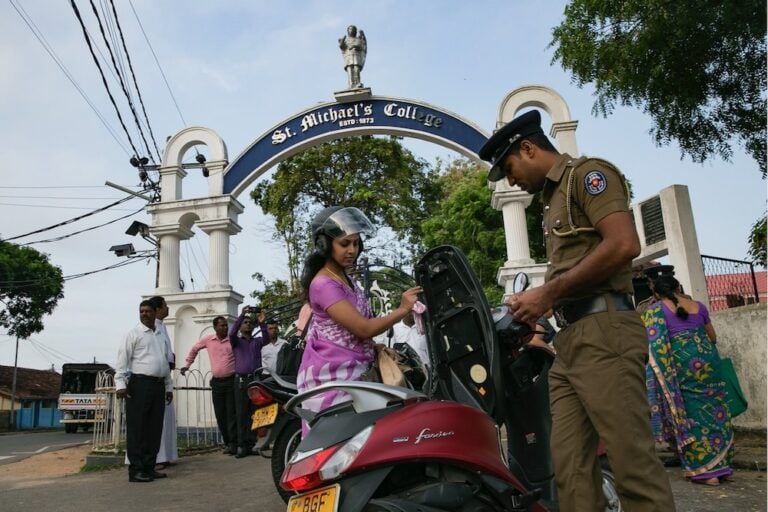(FMM/IFEX) – The following is a 4 July 2007 FMM press release: President’s Comments on Media Freedom and Reform According to state media reports, President Mahinda Rajapakse, in comments made while chairing a “progress review meeting” of the Ministry for Media and Information, reiterated the government’s “commitment to depoliticise media and ensure media freedom” and […]
(FMM/IFEX) – The following is a 4 July 2007 FMM press release:
President’s Comments on Media Freedom and Reform
According to state media reports, President Mahinda Rajapakse, in comments made while chairing a “progress review meeting” of the Ministry for Media and Information, reiterated the government’s “commitment to depoliticise media and ensure media freedom” and has called on all media institutions “to adopt a more ethical and responsible media policy in portraying the truth to the people”.
The president has reportedly also emphasised “the need to get rid of the prevailing political culture at most government-owned media institutions” and “stressed the need for a more vibrant and efficient role for the government-owned media”.
Moreover, President Rajapakse “pointed out that the government-owned media should play a pivotal role in portraying the government’s development work” and the need “for an effective role by the media to project the country’s situation to the international community at a time where various people were trying to tarnish the country’s image by engaging in a slanderous campaign abroad”.
The FMM wholeheartedly welcomes the president’s expression of concern regarding the politicisation of the state-owned and government-controlled media, and the debilitating consequences it has had on freedom of expression in general, and media culture in particular, in Sri Lanka. The FMM, however, is unable to go along with the view that what is being reportedly contemplated is entirely driven by the desire to promote media freedom and capacity-building in Sri Lanka.
In this context, and in view of the fact that the president’s reported observations in relation to the state media are that they should be more efficient and diligent in the positive portrayal of the government’s development programmes and international image, we are unable to share the view that the contemplated changes would have any positive impact on freedom of expression and of the media in Sri Lanka.
The FMM, along with its partner organisations, has consistently advocated a more principled and systematic approach to a national media policy in respect of public service media, and for the removal of the remaining barriers to media freedom in Sri Lanka. In this regard, FMM reiterates its belief that media law reforms cannot be undertaken without the active involvement of individual journalists, representative associations reflecting the diversity of the profession, and without consultation of appropriate expertise.
An independent Media Commission was part of the original draft of what was eventually enacted as the Seventeenth Amendment to the Constitution. The need for such a Media Commission has only increased and a constitutional amendment may be easily promulgated with bi-partisan support to set up an independent Media Commission with the same constitutional standing as the other independent bodies listed in the Schedule to Article 41B of the Constitution. The independent Media Commission should be appointed on the recommendation of the Constitutional Council and must feature the representation of working journalists. The Commission, once constituted, would have overall oversight of public service media and would be responsible and answerable to Parliament.
Within this framework, political control over the state-owned Sri Lanka Broadcasting Corporation (SLBC), the Sri Lanka Rupavahini Corporation (SLRC), and the Independent Television Network (ITN) must immediately be relinquished in favour of an independent regime for public service broadcasting. This must be based on the recommendations of the R. K. W. Goonesekere Committee on Media Reform. Detailed proposals for institutional re-organisation as well as a model public service broadcasting law have been proposed by the FMM and Centre for Policy Alternatives (CPA) as far back as 1996.
In addition to this, the recommendations of the Sidath Sri Nandalochana Committee on the broad-basing of ownership of the Associated Newspapers of Ceylon Ltd (ANCL) need to be immediately implemented.
In addition, ,the FMM strongly recommends that the government consider the following reforms to facilitate the constitutionally-guaranteed freedom of expression and to ensure greater media freedom:
– Enact legislation to enable live broadcast and telecast of debates and proceedings of Parliament and its committees, except where confidentiality is required in line with international best practices.
– Repeal the provisions of the Parliament (Powers and Privileges) Act No. 21 of 1956 (as amended) relating to punishment by Parliament for breach of privilege and contempt so as to bring the Sri Lankan law in line with the modern practice of the House of Commons and other parliaments.
– Enact a Contempt of Court Act in line with international best practices as reflected in the principles of the Manesar Declaration (5 December 2004) so as to confine, structure and regulate the use of judicial contempt powers, consistent with freedom of expression and other fundamental rights.
– Enact a Freedom of Information Act to secure as a right the access to official information; draft legislation for this was approved by Cabinet in 2004.


